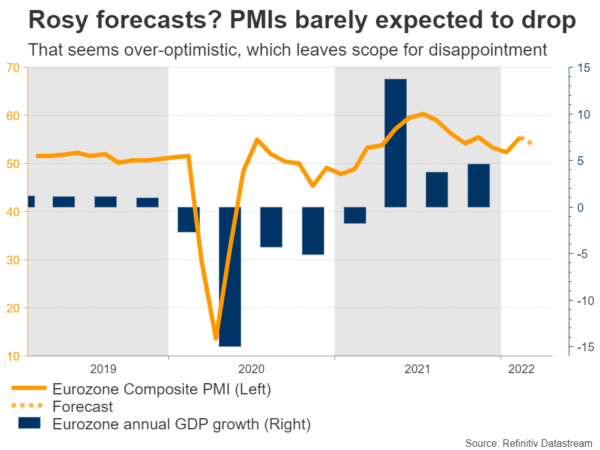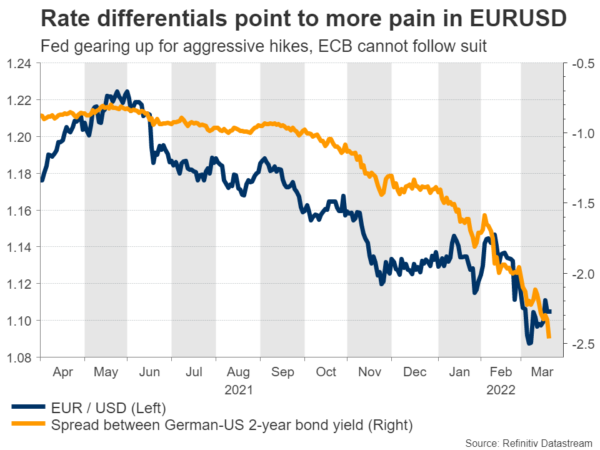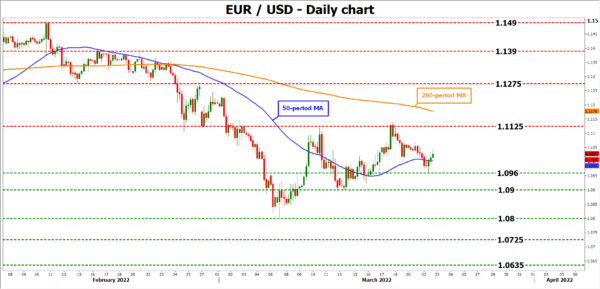The latest PMI business surveys on Thursday will reveal how much damage the war has inflicted on the Eurozone economy. The show will get started with the French numbers at 08:15 GMT. Forecasts from economists suggest a very small economic impact, but that seems unrealistic considering all the uncertainty lately. Instead, the data might reflect the rising risk of a recession, which leaves the euro vulnerable to a negative ‘surprise’.
What’s the damage?
It has been clear from the beginning that the war in Ukraine is bad news for the European economy. Higher energy bills for consumers, rising food prices, and the exposure of European banks to depreciating Russian assets imply that economic growth will take a serious hit.
But estimating how big the fallout will be has been difficult. Will it be just a minor slowdown in growth or could it spark a recession? No economic data has been released since the war erupted, so market participants only had the moves in energy prices and other commodities to go on.
All that will change this week, when the preliminary PMI surveys for March are released. It is probably too early even for businesses to assess the true fallout of the war, but at least these surveys will capture the impact on economic sentiment.
Overoptimistic forecasts
At first glance, the forecasts from economists seem too optimistic. For the Eurozone as a whole, the composite PMI which combines the manufacturing and services sectors is expected to have fallen to 53.9 in March, from 55.5 previously.
This is a very small decline considering the magnitude of recent events. It would signal that the euro area economy is still growing at a solid pace, barely affected by the sanctions or the sharp spike in energy prices.
That seems too rosy. The war is likely to have disrupted supply chains further, not to mention that the higher costs of living will squeeze consumer budgets and could ultimately restrain demand. It would be reasonable to expect a bigger hit than what forecasts suggest from the uncertainty alone.
Therefore, the rosy forecasts leave plenty of room for disappointment. There is a clear risk that the composite index even falls below 50, signaling a contraction in economic activity.
Euro prisoner to geopolitics
Turning to the markets, a negative ‘surprise’ in the PMI data could deal another blow to the battered euro. That said, a weak print wouldn’t be a shock for traders either, so any downside reaction is unlikely to be huge. Taking a technical look at euro/dollar, a potential drop could encounter immediate support around the 1.0960 zone.
Beyond that, everything revolves around whether there’s a ceasefire in Ukraine soon. If so, that would set the stage for a relief rally in the euro, both by calming nerves around further escalation and by cooling commodity prices. In euro/dollar, that could translate into a spike towards the 1.1125 region.
There’s also a two-day summit between European leaders this week that will begin on Thursday. Markets will be looking for any fiscal measures to help cushion the blow on consumers, for instance by temporarily cutting VAT taxes on energy.
All told, it’s difficult to be bullish on the euro these days. Even if Europe dodges a recession, economic growth will likely slow dramatically. And with inflation raging, the ECB cannot really help this time – it needs to gradually raise interest rates.
Peace in Ukraine could enable a relief rally, but unless something drastic changes in the growth outlook, it will be difficult to sustain any bounce.



